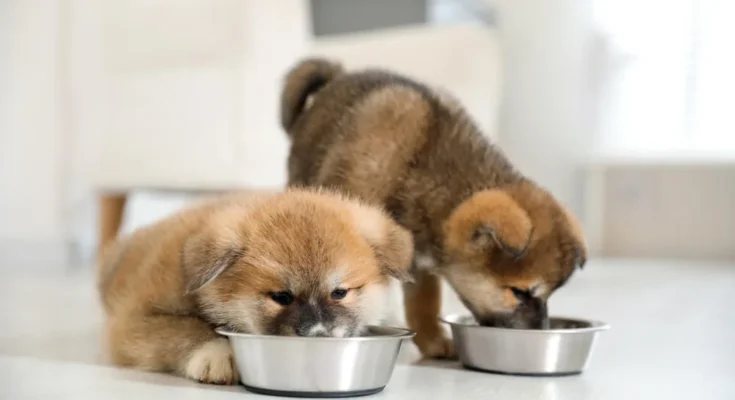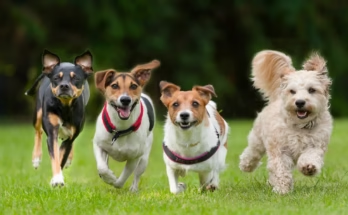Bringing home a puppy is one of the happiest moments for any family. Puppies are playful, cute, and full of love, but they also need proper care to grow into healthy and well-behaved dogs. Taking a puppy care is a big responsibility because they depend on you for everything—food, safety, training, and love.
This guide will help you learn how to care for your puppy in simple and easy steps.
1. Preparing for Your Puppy
Before your puppy arrives, make sure you have everything ready:
- A safe space: Prepare a cozy bed or crate where your puppy can rest.
- Food and water bowls: Choose stainless steel or ceramic ones; they are easier to clean.
- Puppy food: Buy high-quality puppy food suitable for their age and breed.
- Toys: Soft chew toys help with teething and keep them busy.
- Collar and leash: For walking and training.
- Cleaning supplies: Puppies can be messy at first, so keep cleaning items handy.
2. Feeding Your Puppy
Puppies need a balanced diet to grow strong and healthy.
- Choose the right food: Use food specially made for puppies because it has the right nutrients.
- Feeding schedule: Most puppies need 3–4 meals per day. As they grow, you can reduce it to 2 meals a day.
- Fresh water: Always keep clean water available.
Foods to avoid:
- Chocolate, onions, garlic, grapes, raisins, and anything spicy or fried.
- Human junk food or sugary snacks.
3. Vet Visits and Vaccinations
Your puppy’s health is very important. Take them to a veterinarian soon after bringing them home.
- Vaccinations: Puppies need vaccinations to protect them from diseases like rabies, distemper, and parvovirus.
- Deworming: Regular deworming is needed for a healthy tummy.
- Microchip: Helps you find your puppy if it gets lost.
Regular checkups keep your puppy safe and healthy.
4. House Training
House training is one of the first things to teach your puppy.
Tips for house training:
- Take your puppy outside after eating, playing, or waking up.
- Use the same spot every time so they learn quickly.
- Praise and reward your puppy when it goes to the bathroom outside.
- Be patient and consistent. Accidents will happen, but never punish your puppy harshly.
5. Exercise and Play
Puppies are full of energy and need daily exercise to stay healthy.
- Take short walks and play simple games like fetch or tug-of-war.
- Make sure playtime is safe and supervised.
- Avoid over-exercising, especially for very young puppies, as their bones are still growing.
Exercise helps your puppy stay happy and prevents behavior problems.
6. Socialization
Socializing your puppy early is very important so they grow into friendly and confident dogs.
- Introduce them to new people, other dogs, and different places.
- Take them on car rides, to parks, or to pet-friendly shops.
- Make these experiences positive with treats and praise.
A well-socialized puppy is less fearful and more well-behaved.
7. Basic Training
Start teaching simple commands early, like:
- Sit
- Stay
- Come
- No
Use positive reinforcement (treats and praise) instead of punishment. Short training sessions (5–10 minutes) work best for young puppies because they have short attention spans.
Training helps your puppy understand rules and keeps them safe.
8. Grooming Your Puppy
Grooming keeps your puppy clean and healthy.
- Brushing: Brush your puppy’s fur 2–3 times a week to reduce shedding and tangles.
- Bathing: Bathe your puppy every few weeks or when dirty, using puppy-safe shampoo.
- Nail trimming: Keep nails short to avoid injuries.
- Ear cleaning: Gently clean ears with a vet-approved cleaner to prevent infections.
- Teeth cleaning: Start brushing your puppy’s teeth with a dog toothbrush and toothpaste.
9. Teething and Chewing
Puppies love to chew, especially when teething.
Tips to handle chewing:
- Give safe chew toys.
- Keep shoes, wires, and small objects out of reach.
- If your puppy chews something wrong, gently redirect them to a toy.
This helps protect your belongings and keeps your puppy safe.
10. Puppy Safety at Home
Your home should be safe for a curious puppy.
- Keep cleaning chemicals, medicines, and small objects out of reach.
- Block off stairs or dangerous areas.
- Remove poisonous plants from your home and garden.
- Keep electrical wires covered or hidden.
A safe environment prevents accidents and injuries.
11. Love and Bonding
Puppies need love and attention to feel secure and happy.
- Spend time playing and cuddling.
- Talk to your puppy often so it gets used to your voice.
- Give treats and praise for good behavior.
When you show love, your puppy will become more loyal and trust you completely.
12. Patience is Key
Raising a puppy takes time and patience. There will be accidents, chewed-up shoes, and sleepless nights in the beginning. But with love, patience, and consistent care, your puppy will grow into a loving and well-trained companion.
Final Thoughts
Caring for a puppy is like caring for a baby. It needs your time, attention, and love. By feeding them healthy food, keeping them safe, training them early, and giving them plenty of affection, you will raise a happy and healthy dog.
Remember, puppies grow up fast, so enjoy every moment with your little furry friend. The love and loyalty you get in return will be worth all the effort.




